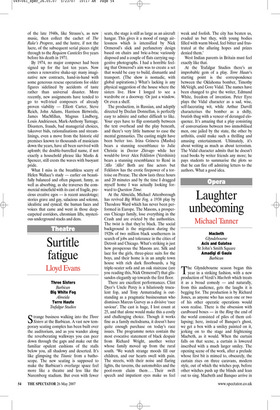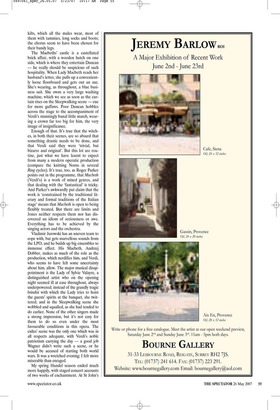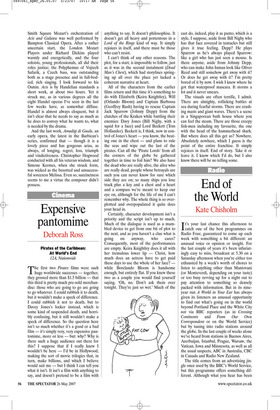Laughter unbecoming
Michael Tanner
Macbeth Glyndebourne Acis and Galatea St John’s Smith Square Amadigi di Gaula Barbican The Glyndebourne season began this year in a striking fashion, with a new production of Verdi’s Macbeth which treats it as a broad comedy — and naturally, from this audience, gets the laughs it is begging for. The production is by Richard Jones, as anyone who has seen one or two of his other operatic operations would soon realise. There is the obsession with cardboard boxes — in the Ring the end of the world consisted of piles of them collapsing; here, instead of Banquo’s ghost, we get a box with a smiley painted on it, jerking on to the stage and frightening Macbeth, as it would. When the curtain falls on that scene, a curtain is lowered inscribed with a much larger smiley. The opening scene of the work, after a prelude whose first bit is mimed to, obscurely, the curtain rises on three caravans, modern style, out of which the witches pop, before other witches push up the blinds and lean out to sing. Macbeth and Banquo arrive in kilts, which all the males wear, most of them with tammies, long socks and boots; the chorus seem to have been chosen for their bandy legs.
The Macbeths’ castle is a castellated brick affair, with a wooden hutch on one side, which is where they entertain Duncan — he really should be suspicious of such hospitality. When Lady Macbeth reads her husband’s letter, she pulls up a conveniently loose floorboard and gets out an axe. She’s wearing, as throughout, a blue business suit. She owns a very large washing machine, which we see as soon as the curtain rises on the Sleepwalking scene — cue for more guffaws. Poor Duncan hobbles across the stage to the accompaniment of Verdi’s stunningly banal little march, wearing a crown far too big for him, the very image of insignificance.
Enough of that. It’s true that the witches, in both their scenes, are so absurd that something drastic needs to be done, and that Verdi said they were ‘trivial, but bizarre and original’. But this lot are routine, just what we have learnt to expect from many a modern operatic production (compare the knitting Norns in several Ring cycles). It’s true, too, as Roger Parker points out in the programme, that Macbeth (Verdi’s) is a work of mixed genres, and that dealing with the ‘fantastical’ is tricky. And Parker’s awkwardly put claim that the work is ‘constrained by the traditional literary and formal traditions of the Italian stage’ means that Macbeth is open to being flexibly treated. But there are limits and Jones neither respects them nor has discovered an idiom of seriousness or awe. Everything has to be achieved by the singing actors and the orchestra.
Vladimir Jurowski has an uneven team to cope with, but gets marvellous sounds from the LPO; and he builds up big ensembles to immense effect. His Macbeth, Andrzej Dobber, makes as much of the role as the production, which nerdifies him, and Verdi, who seems to have felt some uncertainty about him, allow. The major musical disappointment is the Lady of Sylvie Valayre, a distinguished artist who on the opening night seemed ill at ease throughout, always underpowered; instead of the grandly tragic bfindisi with which the Lady tries to hoist the guests’ spirits at the banquet, she twittered; and in the Sleepwalking scene she wobbled and squalled, as she had tended to do earlier. None of the other singers made a strong impression, but it’s not easy for them to do so even under the most favourable conditions in this opera. The exiles’ scene was the only one which was in all respects adequate, with Verdi’s noble patriotism carrying the day — a good job Wagner didn’t write such a scene, or he would be accused of starting both world wars. It was a wretched evening; I felt more miserable than enraged.
My spring Handel season ended much more happily, with staged concert accounts of two works of enchantment. At St John’s Smith Square Mozart’s orchestration of Acis and Galatea was well performed by Bampton Classical Opera. After a rather uncertain start, the London Mozart Players under Richard Dickins played warmly and energetically, and the four soloists, young professionals, all did their roles justice; the Polyphemus of Vojtech Safarik, a Czech bass, was outstanding both as a stage presence and in full-bodied, rich singing. I look forward to his Osmin. Acis is by Handelian standards a short work, at about two hours. Yet it struck me, as in various degrees all the eight Handel operas I’ve seen in the last few weeks have, as somewhat diffuse. Handel is almost always eloquent, but it isn’t clear that he needs to say as much as he does to convey what he wants to, what is needed by the drama.
And the last work, Amadigi di Gaula, an early opera, the latest in the Barbican’s series, confirmed that — though it is a lovely piece and has gorgeous arias, as always, of longing, regret, loss, triumph and vindictiveness. Christopher Hogwood conducted with all his veteran wisdom, and Simone Kermes, when she struck form, was wicked as the besotted and unsuccessful sorceress Melissa. Even so, succinctness seems to me a virtue the composer didn’t possess.




















































































 Previous page
Previous page